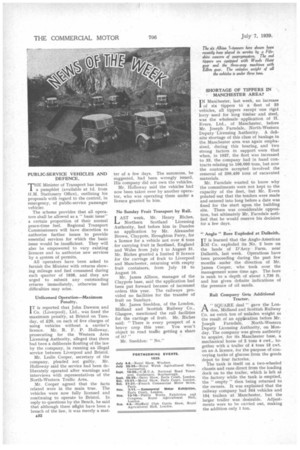PUBLIC-SERVICE VEHICLES AND DEFENCE.
Page 34

If you've noticed an error in this article please click here to report it so we can fix it.
THE Minister of Transport has issued 1. a pamphlet (available at Id. from 11.M. Stationery Office), outlining his proposals with regard to the control, in emergency, of public-service passenger vehicles.
The scheme provides that all operators shall be allowed as a " basic issue" a certain proportion of their normal peace-time fuel. Regional Transport Commissioners will have discretion to authorize further issues to provide essential services for which the basic issue would be insufficient. They will also be empowered to vary existing licences and to authorize new services by a system of permits.
All operators have been asked to furnish the Minister with returns showing mileage and fuel consumed during each quarter of 1938, and they are urged to submit any outstanding returns immediately, otherwise fuel difficulties may arise.
Unlicensed Operation—Maximum Penalty.
I T is reported that John Dawson and Co. (Liverpool), Ltd., was fined the maximum penalty, at Bristol on Tuesday, of £20, on each of five charges of using vehicles without a carrier's licence. Mr. R. F. P. Holloway, prosecuting for the Western Area Licensing Authority, alleged that there had been a deliberate flouting of the law by the company, in running an illegal service between Liverpool and Bristol.
Mr. Leslie Cooper, secretary of the company, pleaded not guilty, Mr. Holloway said the service had been deliberately operated after warnings and interviews with representatives of the North-Western Traffic Area.
Mr. Cooper agreed that the facts related were in the main true. The vehicles were now fully licensed and continuing to operate to Bristol. In reply to questions by the Bench, he said that although there rdight have been a breach of the law, it was merely a mat
a32 ter of a few days. The summons, he suggested, had been wrongly issued. His company did not own the vehicles.
Mr. Holloway said the vehicles had now been taken over by another operator, who was operating them under a licence granted to him.
No Sunday Fruit Transport by Rail.
AST week, Mr. Henry Riches, La Northern Scotland Licensing Authority, had before him in Dundee an application by Mr. Alexander Brown, Claypots, Broughton Ferry, for a licence for a vehicle not over 6 tons . for carrying fruit in Scotland, England and Wales from July 1 to August 31. Mr. Riches granted a limited B licence for the carriage of fruit to Liverpool and Manchester, returning with empty fruit containers, from July 10 to August 10.
Mr. James Allison, manager of the Claypots base, said the application had been put forward because of increased orders this year. The railways provided no facilities for the transfer of fruit on Sundays.
Mr. James Sneddon, of the London. Midland and Scottish Railway Co., Glasgow, mentioned the rail facilities for the carriage of fruit. Mr. Riches said: "There is every prospect of a heavy crop this year. You won't object to road traffic getting a share of it? "
Mr. Sneddou: "No." SHORTAGE OF TIPPERS IN MANCHESTER AREA?
I N Manchester, last week, an increase
of six tippers to a fleet of 33 vehicles, all tippers except one rigid lorry used for long timber and steel, was the wholesale application of H. Evers, Ltd., of Manchester, before Mr. Joseph Ferndale, North-Western Deputy Licensing Authority. A definite shortage of this class of haulage in the Manchester area was again emphasized, during this hearing, and two strong factors in support were that when, in 1937, the fleet was increased to 33, the company had in hand contracts relating to 106,000 tons, but now the contracts accepted involved the removal of 209,450 tons of excavated materials.
Mr. Ferndale wanted to know why the commitments were not kept to the capacity of the fleet, but Mr. Evers pointed out that the tenders were made and entered into long before a date was fixed for the start upon the building site. There was considerable opposition, but ultimately Mr. Ferndale notified that he would reserve his decision for a few days.
" Anglo " Bore Exploded at Dalkeith.
I T is learned that the Anglo-American Oil Co. exploded its No. 2 bore on the lands of D'Arcy Farm. near Dalkeith, last week. Operations have been proceeding during the past few months under the direction of Mr. James Cooper, who took over the management some time ago. The bore is sunk to a depth of about 1,730 ft. and has given definite indications of the presence of oil sands.
Rail Company Gets Additional Tractor.
A" SQUARE deal" gave the London, Midland and Scottish Railway Co. ari extra ton of unladen weight as the result of an application before Mr. Joseph Ferndale, North-Western Deputy Licensing Authority, on Monday. The company was given authority to acquire, for its Manchester base, a mechanical horse of 2 tons 4 cwt., together with a trailer of 4 tons 15 cwt. on an A licence, for the purpose of conveying tanks of glucose from the goods depot to four factories.
The tank is itself on a two-wheeled chassis and runs direct from the loading dock on to the trailer, which is left at the factory while the tank is emptied, the " empty " then being returned to the owners. It was explained that the railway company had 344 vehicles and 154 trailers at Manchester, but the larger trailer was desirable. Adjustments were to be carried out, making the addition only I ton.




















































































